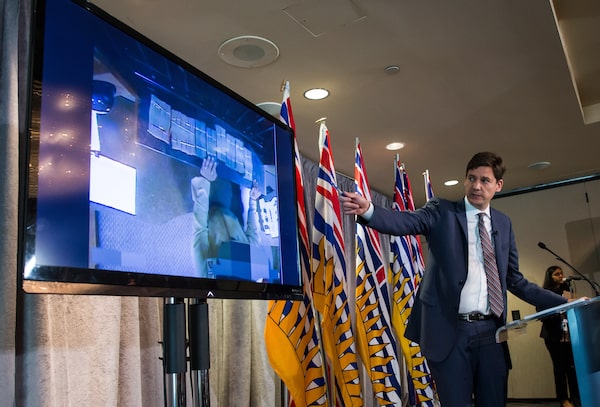When RCMP raided the offices of Silver International Investments Inc. in Richmond, B.C., they found a $2-million stash of $20 bills, along with records pointing to a much bigger operation. Law-enforcement officials would eventually conclude that the company was part of an alleged scheme to launder hundreds of millions of dollars a year in dirty money from China through various casinos in the province, including the nearby River Rock Casino.
Three years later – just as the case was set to go to trial – the Mounties and federal prosecutors abruptly stayed criminal charges against the company and its two principal operators, Caixuan Qin and Jain Jun Zhu. Officials acknowledged there was no “reasonable prospect” of getting a conviction.
Just like that, one of the largest money-laundering investigations in Canadian history, dubbed E-Pirate, hit a brick wall.
The case’s collapse suggests something went “terribly wrong,” B.C. Attorney-General David Eby lamented this week. “To have it fail is … very devastating for all of us who are trying to get dirty money out of our economy."

B.C. Attorney General David Eby gestures while showing a video of bundles of cash brought to a casino by a person, after releasing an independent review of anti-money laundering practices during a news conference in Vancouver, on June 27, 2018.DARRYL DYCK/The Canadian Press
Canada already enjoys an international reputation as a nice, peaceful country where it’s far too easy to hide and launder ill-gotten wealth. And this case’s demise is likely to enhance our allure in the murky world of dirty money.
“Canada has been famously named as the place where people come to ‘snow-wash’ their dirty money,” said Kevin Comeau, a Toronto lawyer and anti-money-laundering expert.
That’s unfortunate because authorities are only belatedly taking the problem seriously in Canada. Earlier this month, the House of Commons finance committee issued a long-awaited report, highlighted by a key recommendation to deal with the problem of beneficial ownership.
Unlike a legal owner, who typically holds the title to an asset, a beneficial owner may exercise influence through voting rights or other unseen forms of control. While the name of a legal owner is public, the beneficial owner’s name is often not.
Knowing who owns a property or a company is the missing link between the crime of laundering money and the illegal activities where that cash is generated, ranging from tax evasion to terrorism and drug smuggling. The ability of people to hide behind proxies and numbered companies – as they can now do in Canada – is the main obstacle to rooting out money laundering.
And so it was welcome news that the committee’s main recommendation is to “create a pan-Canadian beneficial ownership registry for all legal persons and entities” who have “significant control” over assets, such as real estate, stocks or companies.
The problem, experts say, is that other countries are moving much faster to create the legislative and regulatory structures to track, expose and prosecute money launderers. Putting the recommendations into law could take a year or more, given next year’s looming federal election.
“We are updating our laws, but not bringing them up to the standard of what other nations are doing,” Mr. Comeau explains. “We are very much the laggards now.”
And dirty money inevitably exploits weak links in the global financial system, especially in rich developed countries such as Canada where corruption is rare.
Unfortunately missing from the committee report is a nod to creating a new charge, punishable with prison time, for those who conceal the real owner of assets they hold in their disclosures to banks, law firms, realtors and other non-government entities. Such false claims, Mr. Comeau says, is often the “rabbit hole” that thwarts law enforcement from linking cleansed assets to criminals.
Also lacking is a requirement that the new beneficial-ownership registry be publicly accessible, depriving officials of help from individual citizens and whistle-blowers.
Now maybe you think money laundering doesn’t affect you – that it’s an invisible and victimless crime. Well, consider the volume of illegal money that is likely flowing into Canada to be washed, and where it all ends up. Low-ball estimates put the figure at $40-billion to $100-billion a year.
Some might argue that foreign direct investment, dirty or not, is better than none at all. It drives real estate and construction activity, generates millions of dollars in revenues for government-run casinos, and no doubt creates hundreds of thousands of jobs.
But at what cost? Assume that much of this illicit money goes into real estate. It may explain why so many middle-class Canadians may never be able to afford a home in some of Canada’s largest cities, driving deep wedges between haves and have-nots.
That is a very steep price for the sale of a country.
Editor’s note: An earlier version of this story said there should be a new charge, punishable with prison time, for those who falsely claim to own laundered assets. A more complete description has been added.